Sketch of Public Policy Communion, April 2025Date: 2025-05-22
Section: Activity | 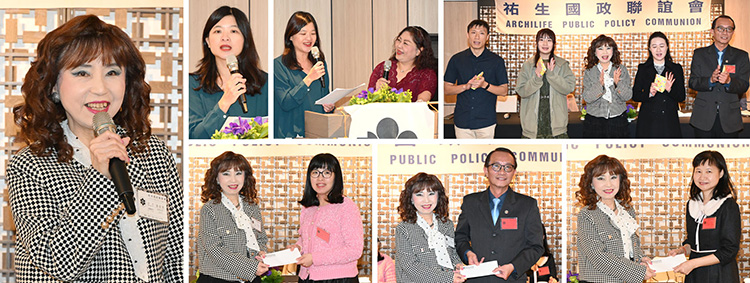
本會於2025年4月13日假台北晶華酒店地下三樓晶英會舉行「祐生國政聯誼會」。由主持人黃晉英秘書長宣布後揭開當日活動序幕,在輕鬆、活潑的節目之下,隨即由主持人帶來重要訊息:「美國總統川普以商業談判的方式與全球各國實施全面性關稅措施,造成全球股市劇烈震盪,並對國際貿易與經濟產生深遠影響。對個人而言,面對這樣的局勢,應重新思考未來的布局策略,以因應不穩定的時代。此外,近期氣溫變化劇烈,氣候異變議題仍應持續關注,我們在日常生活與各項決策中,都應留意氣候異變可能帶來的風險,方能趨吉避凶,妥善因應未來挑戰。」
The April Archilife Public Policy Communion of 2025 was held on April 13, 2025. After a series of relaxing and fun activities, Secretary General Huang Chin-ying made the following announcement, "US President Donald Trump implemented a reciprocal tariff policy through business negotiations, which caused drastic volatility in global stock markets and had a profound effect on international trade and economic. From a personal standpoint, it is imperative to reevaluate future layouts and strategies in order to effectively navigate periods of instability in light of this situation. Furthermore, the recent temperature changes are drastic, and the issue of climate change should continue to be paid attention to. It is imperative that we pay attention to the risks potentially brought about by climate change in our daily lives and during various decision-making processes in order to avoid calamity."
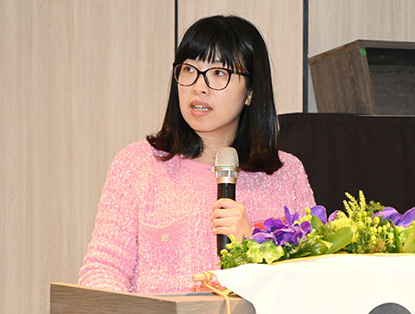 緊接著進行專題演講,由生活特組組長鄭瑋寧小姐進行「生活特組2024年下半年研究成果報告」。主講人表示氣候異變與數位科技相互激盪下,人文環境亦面臨前所未有的挑戰。生活特組2024年下半年的研究,分為兩個步驟。第一個步驟是由組員進行議題發想、資料收集、分析後提出專題報告,本階段組員報告的主題,內容涵蓋與環境演變、物質文明及精神文明相關課題。第二個步驟是彙整專題報告的要點與成果後,聚焦研討環境演變趨勢、物質文明調適與精神文明初探等議題。2025年上半年將持續針對疫後新世界進行發想與研討,希望能作為基金會導引人類度過生存考驗,進而開啟人類新文明的重要參考。 緊接著進行專題演講,由生活特組組長鄭瑋寧小姐進行「生活特組2024年下半年研究成果報告」。主講人表示氣候異變與數位科技相互激盪下,人文環境亦面臨前所未有的挑戰。生活特組2024年下半年的研究,分為兩個步驟。第一個步驟是由組員進行議題發想、資料收集、分析後提出專題報告,本階段組員報告的主題,內容涵蓋與環境演變、物質文明及精神文明相關課題。第二個步驟是彙整專題報告的要點與成果後,聚焦研討環境演變趨勢、物質文明調適與精神文明初探等議題。2025年上半年將持續針對疫後新世界進行發想與研討,希望能作為基金會導引人類度過生存考驗,進而開啟人類新文明的重要參考。
Next on the schedule was the keynote speech. First, Ms. Cheng Wei-ning presented a speech on the "Archilife Living Special Team's Research Result Report for the Second Half of 2024". According to the speaker, the interaction between climate change and digital technology posed unprecedented challenges to human-centered environments. The Living Special Team's research in the second half of 2024 was divided into two stages. The first step entailed team members developing topic concepts, collecting data, and presenting reports on special topics following analysis. During this stage, members' reports on special topics addressed issues such as environmental evolution, material civilization, and spiritual civilization. After compiling the main points and results of the special topic reports, the second stage focused on environmental evolution trends, material civilization adaptation, and preliminary research on spiritual civilization, among other issues. In the first half of 2025, concept development and discussions would continue to focus on the post-pandemic new world. It was anticipated that the aforementioned would serve as significant references for the Foundation in guiding humanity through the survival test, thereby establishing a new civilization.
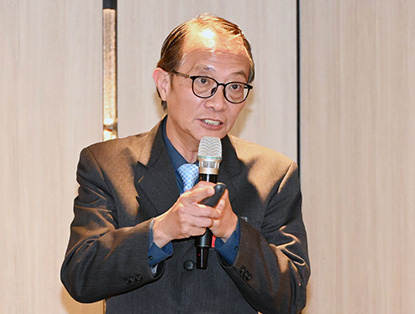 接著由國政委員林得恩先生主講「盤點2024臺灣天災」。主講人表示2024年極端天氣強度加劇、延時加長,每每打破歷史紀錄,期望藉由分析2024年的天災異變,讓我們可以得到啟發並事先防範。首先為4月3日花蓮芮氏規模7.1大地震,重挫花蓮觀光業,接著,2024年全球及台灣均溫皆創下歷史新高,以及登陸台灣的強烈颱風數量之多為近年少見,而2024年的冬天也較往年冷得早、冷得久、冷得猛。對於上述災害,主講人也提出因應方式,包含調整傳統既有作業模式、重新檢視安全風險閥值、熟稔災害避難緊急應處及精進氣象預報情資掌握等。主講人期望大家以更為嚴謹、積極、敬畏的態度,來面對極端天氣。 接著由國政委員林得恩先生主講「盤點2024臺灣天災」。主講人表示2024年極端天氣強度加劇、延時加長,每每打破歷史紀錄,期望藉由分析2024年的天災異變,讓我們可以得到啟發並事先防範。首先為4月3日花蓮芮氏規模7.1大地震,重挫花蓮觀光業,接著,2024年全球及台灣均溫皆創下歷史新高,以及登陸台灣的強烈颱風數量之多為近年少見,而2024年的冬天也較往年冷得早、冷得久、冷得猛。對於上述災害,主講人也提出因應方式,包含調整傳統既有作業模式、重新檢視安全風險閥值、熟稔災害避難緊急應處及精進氣象預報情資掌握等。主講人期望大家以更為嚴謹、積極、敬畏的態度,來面對極端天氣。
Next, Mr. Lin De-en spoke on "2024 Inventory of Natural Disasters in Taiwan". The speaker stated that in 2024, extreme weather intensified and persisted, breaking records on multiple occasions. It is anticipated that the analysis of natural disasters in 2024 will provide us with insights and enable us to prevent them in advance. First, on April 3, a 7.1 magnitude earthquake struck Hualien, devastating the tourism industry. The average temperature around the world and in Taiwan in 2024 reached record highs, and the large number of powerful typhoons that have made landfall in Taiwan is unusual in recent years. Furthermore, the winter of 2024 arrived earlier, was colder, lasted longer, and was more intense than in previous years. The speaker also suggested ways to cope with the aforementioned disasters. They included adjusting existing conventional operational models, re-examining safety risk thresholds, familiarizing oneself with disaster evacuation and emergency response procedures, and improving understanding of weather forecast information. The speaker hoped that everyone would approach extreme weather with a more rigorous, active, and awestruck mindset.
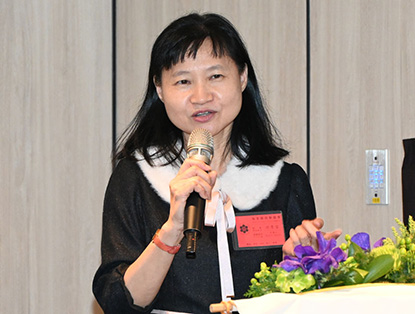 接著由國政委員游秀雲小姐主講「臺灣華語教學的發展」。主講人表示本年度以「2025年中國文學之學理與應用國際學術研討會」籌備會秘書長之職,邀請日本、韓國及中國學者進行專題演講、發表論文,分享各華文領域的研發成果。藉由國際交流活動,可瞭解到在漢文化影響下臺灣與周邊國家的競合關係。主講人接著提到台灣目前有許多機構進行華語教學發展,包含政府機關、大專院校及民間組織,特別提到教育部臺灣華語教育資源中心的任務,為行政服務、教學系統、華語師資支援及推廣與國際行銷,網站上亦有相當豐富資源可一探究竟。另外,僑委會亦有全球華文網,提供海外朋友學習華文的管道。 接著由國政委員游秀雲小姐主講「臺灣華語教學的發展」。主講人表示本年度以「2025年中國文學之學理與應用國際學術研討會」籌備會秘書長之職,邀請日本、韓國及中國學者進行專題演講、發表論文,分享各華文領域的研發成果。藉由國際交流活動,可瞭解到在漢文化影響下臺灣與周邊國家的競合關係。主講人接著提到台灣目前有許多機構進行華語教學發展,包含政府機關、大專院校及民間組織,特別提到教育部臺灣華語教育資源中心的任務,為行政服務、教學系統、華語師資支援及推廣與國際行銷,網站上亦有相當豐富資源可一探究竟。另外,僑委會亦有全球華文網,提供海外朋友學習華文的管道。
Next, Ms. Yu Hsiu-yun spoke on "Development of Mandarin Teaching in Taiwan". The speaker stated that this year, as the secretary general of the preparatory committee of the "2025 International Academic Conference on Chinese Literature Principles and Applications", scholars from Japan, Korea, and China were invited to deliver speeches, publish papers, and share the R&D results in the field of Mandarin. International exchange activities provided insight into Taiwan's competitive relationships with neighboring countries under the influence of Han culture. The speaker went on to say that there were numerous institutions in Taiwan that are currently developing Mandarin teaching methods. These institutions included government agencies, colleges, and private companies. The tasks of the Taiwan Mandarin Educational Resources Center (TMERC) were specifically mentioned, including administrative services, teaching systems, support and promotion of Mandarin teachers, and international marketing. Furthermore, the website offered a wealth of resources for individuals to explore. Additionally, the Taiwan Center for Mandarin Learning website offered by the Overseas Community Affairs Council, R.O.C. (Taiwan) enabled individuals worldwide to learn Mandarin.
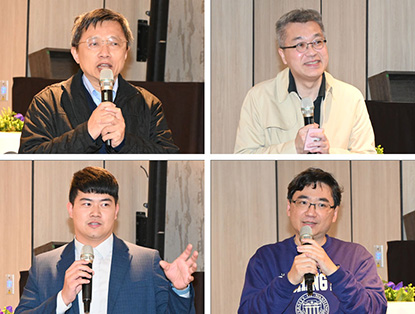 演講完畢,黃晉英秘書長代表基金會致贈謝禮予主講人。接著在與會者紛紛利用「餵豬時間」提出個人意見與看法交流後,圓滿地結束四月份國政聯誼會。 演講完畢,黃晉英秘書長代表基金會致贈謝禮予主講人。接著在與會者紛紛利用「餵豬時間」提出個人意見與看法交流後,圓滿地結束四月份國政聯誼會。
After the speech, Secretary General Huang Chin-ying presented a gift to the speakers on behalf of the foundation. Then, attendees expressed and exchanged their opinions and views during the piggy hour. The March Archilife Public Policy Communion ended smoothly.
|
|